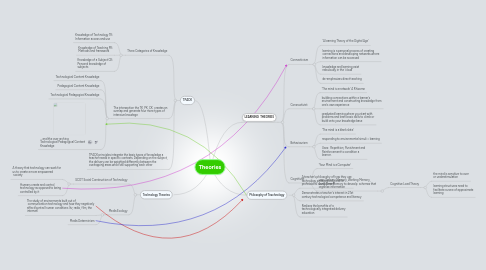
1. TPACK
1.1. Three Catagories of Knowledge
1.1.1. Knowledge of Technology TK: Information access and use
1.1.2. Knowledge of Teaching PK: Methods and framework
1.1.3. Knowledge of a Subject CK: Personal knowledge of subjects
1.2. The intersection the TK, PK, CK creates an overlap and generate four more types of intensive knowlege
1.2.1. Technological Content Knowledge
1.2.2. Pedagogical Content Knowledge
1.2.3. Technological Pedagogical Knowledge
1.2.4. ... and the over arching Technological Pedagogical Content Knowledge
1.3. TPACK principles integrate the basic types of knowledge a teacher needs in specific contexts. Depending on the subject, the delivery can be weighted differently between the overlapping areas while still supporting each other
2. Technology Theories
2.1. SCOT Social Construction of Technology
2.1.1. A theory that technology can work for us to create a more empowered society
2.1.2. Humans create and control technology as opposed to being controlled by it
2.2. Media Ecology
2.2.1. The study of environments built out of communication technology and how they negatively affect/control human conditions (tv, radio, film, the internet)
2.2.2. Media Determinism
3. LEARNING THEORIES
3.1. Connectivism
3.1.1. 'A learning Theory of the Digital Age'
3.1.2. learning is a personal process of creating connections and developing networks where information can be accessed
3.1.3. knowledge and learning exist nebulously in the 'cloud'
3.1.4. de-emphasizes direct teaching
3.2. Consructivist
3.2.1. 'The mind is a network' A Rhizome
3.2.2. building connections within a learner's environment and constructing knowledge from one's own experience
3.2.3. graduated learning where you start with problems and learn basic skills to climb or build onto your knowledge base
3.3. Behaviourism
3.3.1. 'The mind is a blank slate'
3.3.2. responding to environmental simuli = learning
3.3.3. Uses: Repetition, Punishment and Reinforcement to condition a learner.
3.4. Cognitivist
3.4.1. 'Your Mind is a Computer'
3.4.2. uses Sensory Memory, Working Memory, Long Term Memory to deveolp schemas that organize information
3.4.2.1. Cognitive Load Theory
3.4.2.1.1. the mind is sensitive to over or understimulation
3.4.2.1.2. learning structures need to facilitate a zone of approximate learning
